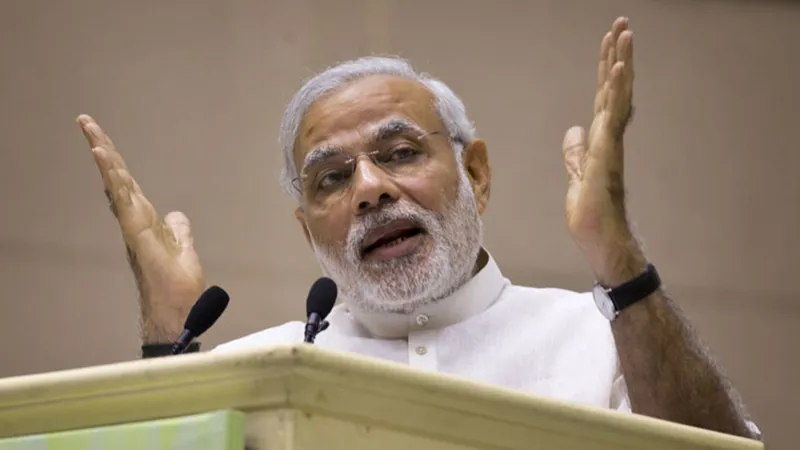Prime Minister Narendra Modi's visit to Canada this week should help rejuvenate an important relationship that has long been neglected in New Delhi. If real political differences alienated India and Canada during the Cold War, it is Delhi that has not been sufficiently attentive to the possibilities with Canada in recent years.
To be sure, India's relations with Canada have significantly improved in recent years, thanks to the resolution of the nuclear dispute that derailed bilateral ties after India exploded an atomic device in 1974. But they have lacked a strategic character. Modi is promising to change that by putting Canada at the top of India's foreign policy priorities.
Canada is rich in energy resources - uranium and hydrocarbons - that India badly needs. Canada's one million-plus Indian origin population is smaller than that in the US. But as a proportion of the total population, the Indian overseas community in Canada is much larger. It is a leading member of the Western world, with significant influence of its own around the globe. Modi's connection with the diaspora, especially the Gujarati communities abroad, has sensitised him to the great value of the English-speaking world, especially outside Great Britain, for the people of India.
The G-20 summit last November provided Modi the opportunity to spend some quality time in Australia. Modi was, in fact, the first Indian PM to visit Australia since Rajiv Gandhi in 1986. Modi is now the first Indian PM to visit Canada on a bilateral visit after Indira Gandhi in 1973.
Force multiplier
This special moment in India's relations with Australia and Canada is amplified by the fact that Modi shares a conservative view of politics and economics with Prime Ministers Tony Abbott of Australia and Stephen Harper of Canada. By drawing Australia and Canada closer to India, Modi hopes to cash in on a valuable political inheritance from the colonial era and give India a special global reach.
Like Australia in the east, Canada in the west is deeply bound to India through the colonial connection. India and Canada have similar political systems built around the Westminster system. Unlike Britain, India and Canada are federal polities. Their shared Anglo-Saxon heritage includes the embrace of the Common Law tradition. Besides hosting a large number of Indian students, workers and professionals, Canada is an open economy that has welcomed Indian capital.
Canada, like Australia, has punched way above its weight in world affairs. Despite being a close ally of the US, Canada has developed an independent approach in many areas of foreign policy and has cultivated an international profile all of its own. Put another way, Canada, like Australia, can be a major political force multiplier for India in the global arena.
On security affairs, Canada is part of the oldest and most successful international alliance for intelligence gathering - the so-called "Five Eyes" mechanism. Established in the wake of World War II by the US, Canada, Great Britain, Australia and New Zealand, Five Eyes has expanded to include France and many other countries.
As they face similar threats from religious extremism and terrorism, India and Canada can significantly expand their intelligence-sharing on a bilateral basis. Modi and Harper should also begin discussing the possibilities for India becoming a member of the Five Eyes framework.
Indo-Pacific
On his visit to Canada, Modi has an opportunity to integrate Ottawa into his strategic vision for the Indo-Pacific that was unveiled in his talks with US President Barack Obama in Delhi in January and during the "Sagar Yatra" to Seychelles, Mauritius and Sri Lanka in March this year.
As India's security perimeter extends beyond the Indian Ocean into the Pacific, Delhi will find the partnership with Ottawa quite beneficial. Canada is a founding member of the forum for the Asia Pacific Economic Cooperation (Apec) and has taken an active part in shaping the debates about Asian security in the Asean regional forum. Canada, however, is not a member of the East Asia Summit that India is part of. Delhi, however, is not a member of the Apec.
Delhi and Ottawa have a shared interest in building a stable architecture of regional cooperation in Asia and can assist each other in raising their respective roles in the Indo-Pacific.
Canada is also a leading player in the Arctic, which has acquired a new strategic significance in recent years. Ottawa was helpful in India gaining the status of permanent observer at the Arctic Council in 2013. If Canada has inherited the Anglo-Saxon maritime orientation, a rising India is beginning to rediscover the logic of sea power. Maritime security cooperation, then, could be a powerful instrument for bringing India and Canada together in coming years.
(The writer is a Distinguished Fellow at Observer Research Foundation, Delhi and a Contributing Editor for 'The Indian Express')
Courtesy: The Indian Express, April 14, 2015
The views expressed above belong to the author(s). ORF research and analyses now available on Telegram! Click here to access our curated content — blogs, longforms and interviews.
